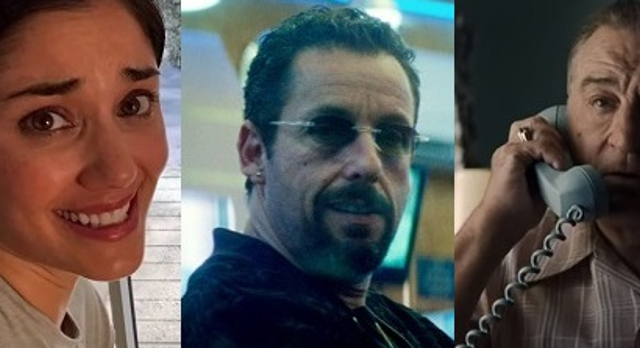Movies talk to each other. What did the films of 2019 have to say? This is a look at how two movies (and one commercial) from the past year tackle similar subjects in different ways. Be warned: SPOILERS for The Irishman and Uncut Gems follow.
Martin Scorsese had a busy 2019. In addition to completing and promoting The Irishman, he spent a good chunk of time dealing with The Discourse around his dismissal of Marvel movies. Much of this discussion was as welcome as a frozen fish in the back seat of a car, but it led to Scorsese expanding on his position in a New York Times op-ed that was measured and complimentary to individuals but even more damning of the larger entertainment system in which they work. A system which Scorsese sees as increasingly denying the possibility that work can be surprising and meaningful. “The most ominous change has happened stealthily and under cover of night: the gradual but steady elimination of risk,” Scorsese wrote.
Scorsese’s thoughts were generally received in the context of The Irishman’s production. He couldn’t find a major studio to finance the admittedly expensive effects needed to de-age Robert DeNiro, Al Pacino and Joe Pesci for a century-spanning tale of the Mafia. He had to rely on Netflix, a company more invested in the living room binge than the cinematic experience, for backing. But while the movie was seen as a gamble, its subject is determined to avoid risk. Frank Sheeran does what he is told, whether that is to slaughter prisoners in World War II, as a button man of the Greatest Generation, or to kill people who are making things difficult for Pesci’s mob boss Russell Bufalino or Pacino’s Jimmy Hoffa. The movie’s original title, which is still used in the credits, is I Heard You Paint Houses – referring to slang for being a hitman that also lets Sheeran paint himself as another working stiff.
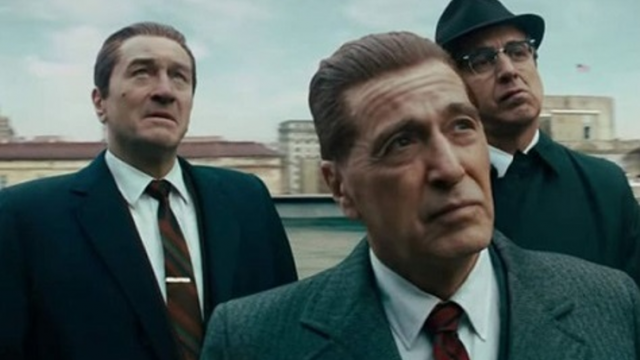
Sheeran’s numerous killings are generally shot in a workmanlike fashion as well. After all, he is the one telling this story. Instead of the flash often found in other Scorsese movies about men doing evil deeds, Sheeran’s actions have the rhythm of a comfortable job. He’s even-keeled and punching the clock, whether he’s shooting up a restaurant or running guns to Bay of Pigs invaders. He gets material comfort out of this and although it’s obvious that the people above him are doing even better, what he really gets is the comfort of not having to worry. He tells his family that he’s acting to protect them because there are “bad men” out there and it’s bitterly and obviously ironic, but he’s not wrong. There are bad men, and by being one of them he doesn’t have to risk them coming to his door. Until of course one does, and tells him to kill his best friend. It tears Frank up inside, but he doesn’t risk defiance. He chooses the company and he does what he’s told.
Howard Ratner, the gambling addict and jewelry dealer antihero of Uncut Gems, does not do what he’s told. He doesn’t stop watching the game when his wife says so, he doesn’t stop using his partner’s fake Rolexes to pay down his own debts when the partner calls him out, he doesn’t stop gambling when large men threaten to cause him harm if he doesn’t pay up. Howard appears to be a businessman of fairly comfortable means with a store full of bling, a nice house in the ‘burbs for his family and a penthouse in the city for his mistress. And at the beginning of the movie, he has his health – his latest colonoscopy says so. So why is he constantly risking everything?
Because the risk is how he wins, Howard says, and winning, or the prospect of it, is how he lives. Writer/directors Josh and Bennie Safdie have drawn comparisons to Scorsese – they too are New Yorkers with a fascination for crime – but their vibe is cleaner in its intensity than, say, the live wire of a coked-up Henry Hill on a certain May 11. They film Adam Sandler’s Howard as constantly in action, but that action could be the outsized gestures of a garrulous salesman, furious texts to his mistress or the focused watching of a basketball game. Howard is moving with purpose and intent, solving problems by making more, until he seems to hit a wall. Toward the end of the movie, after a long weekend of chasing the cash he needs to pay off his bookie (who also happens to be his brother-in-law Arno) and avoid immediate harm, Howard scrapes together enough money for a payment that will loosen the noose around his neck. It’s not his original score, not what he promised his creditors and himself, but enough to let everyone walk away reasonably content.
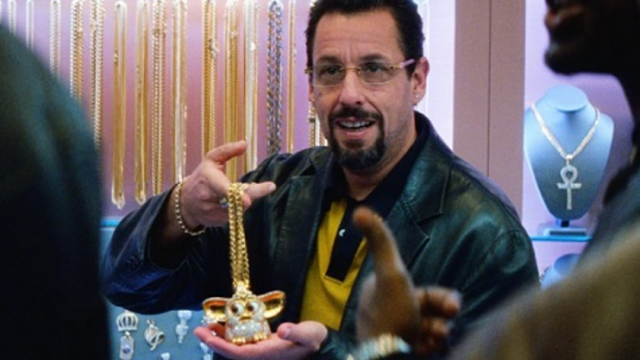
“Reasonable” and “content” are blasphemous. Almost immediately, at the barest hint of another edge, Howard changes plans. He takes all of the money and puts it down on a new bet to the bafflement of Arno and the potentially murderous rage of the goons he’s hired. Howard traps Arno and his thugs in his jewelry store and watches how his bet plays out in an NBA playoff game – where most sports movies make the outcome of the game interesting because of the viewer’s identification with the players, here we’re watching another viewer and yet the tension is even greater. Howard rants and curses and paces and jabs, he’s living the game he watches and the bet he made, the risk he takes.
That risk that pays off and Howard wins his bet, making him a millionaire and giving him more than enough money to pay Arno down. Howard joyously frees his antagonists and the lead goon immediately shoots him in the head and begins to rob the store, killing a horrified Arno as well. Frank Sheeran would probably not approve of the killings themselves – unsanctioned, openly motivated by exasperation and hate – but it’s not hard to imagine him agreeing in principle. Even if it paid out, you can’t trust a risk like that. Not if you’re running a business.
The Irishman was an expensive and risky prospect, but it offered numerous points of stability for the skeptical investor – a legendary director revisiting a popular subject (no 16th century Portuguese missionaries here) with beloved actors. A master in the field looking to execute a bold vision. An individual with big plans who isn’t interested in listening to people telling him what to do, in other words, and I get the sense that when the money men look at Martin Scorsese, they see Howard Ratner. Because they write bigger checks to lesser artists all the time, don’t they? JJ Abrams on Star Trek, Colin Trevorrow on Jurassic World, the Russos for half the Marvel movies. The money isn’t the problem with those guys, because they’ll ultimately spend it how the studios want it. Howard Ratner strikes a deal, then throws the money in a bag and throws the bag out the window because he has a feeling. That kind of risk simply can’t be allowed.
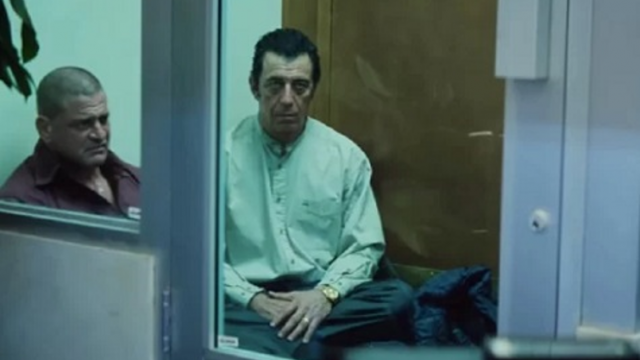
When I read Scorsese’s essay in the NYT and reached that line about “the gradual and steady elimination of risk,” my mind immediately flashed to one of the best articles I read in 2019, a long piece in The Ringer by David Hill about sports betting. Hill looks at how the slow legalization of that kind of gambling throughout the U.S. is crushing the Ratners of the trade, the sharps, people who work the line and bet six figures on a weekend to clear four at best. Because the European firms that are stepping up to run sports books are banning the sharps, not allowing large bets, refusing to permit risk from people willing to trade on skill and bravado in favor of focusing their product toward casual marks. “There is a law of diminishing returns for the bookmaker who will tolerate no risk, unless that bookmaker can continually locate new, untapped pools of players, like an energy company constantly looking for new pockets of oil or gas buried beneath the shale,” Hill writes, making a pointedly destructive simile. And he describes these fitted-suit poindexters making their case at a convention heralding a glorious new age: “I am struck by how little discussion there is of actual gambling. Gambling, it seems, is only what the customer is doing. Gambling is for suckers. For this new generation, bookmaking isn’t gambling. It is simply finance. And it must never, ever lose money. Not $20,000, not $20.”
The Ringer is getting bought by Spotify, by the way. It’s a good investment, no doubt. I hope paying someone to spend a few months to write 2,000 words will still be a part of the business model, but it sounds a bit risky.
Ten years ago, Folgers Coffee made what they thought was a clever but not very risky – certainly not risque – commercial about a family. The concept of the ad was simple enough: A young man comes home for the holidays after years abroad working for the Peace Corps and reconnects with the sister who grew up missing him, all while some delicious Folgers coffee is brewing. But something in the performances and the direction suggested a story underneath the story: These two siblings are totally fucking. As Gabriella Paiella describes in a very funny oral history for GQ on the occasion of the ad’s 10th anniversary, the undertones were not only strong enough for the commercial to become a national inside joke, but the basis for an entire subset of incest fanfiction: Folgerscest. “It’s almost universally agreed that the reason the brother joined the Peace Corps was to get as far away from home as possible, trying to outrun his incestuous feelings,” one writer tells Paiella. People dug into a 30-second commercial, the most disposable of entertainment, and found uncertainty and weirdness to explore.
Because I believe in due diligence, I googled “Peloton fan fiction” when writing this piece, and very little popped up. What writing existed seemed to predate the infamous exercise equipment commercial that consumed American culture last Thanksgiving weekend, a commercial where an oddly nervous woman gets an exercise bike and makes a video of her using it over a year for the husband who gifted her the bike to begin with. Like the Folgers commercial, there’s more to see here if you want to – why is the woman so anxious? Is she a hostage? Also like the Folgers commercial, Peloton said they were just trying to make a heartwarming ad with no undercurrents and I believe them. And because my belief in due diligence only goes so far I did not investigate further into potential fan fiction beyond googling, but I hope the ad has inspired a outburst of erotic stories similar to Folgerscest, maybe S&M-oriented. Because the resulting weeks(!) of discussion around a 30-second ad spot became not a celebration of weirdness, but a tedious cycle of Content.

Online opinionators wrote about the commercial’s gender and economic dynamics. News organizations wrote about the opinions. The actors were interviewed, questioned, condemned, defended. The woman eventually appeared in another ad for a gin promoted by Ryan Reynolds, directly referencing the previous commercial and creating that most precious of objects, a cinematic universe. It wasn’t just that this dumb ad for the exercise bike version of a Lexus had captivated people’s attention, it was that attention was so empty. When The Irishman came out numerous people attacked the lack of dialogue for Anna Paquin (as Frank Sheeran’s daughter Peggy) with the same scolding and indignation brought to the Peloton ad, but love it or hate it The Irishman has substance, themes and ideas to digest. One of the fanfiction writers in Paiella’s article talks about how the Folgers ad is a good jumping-off point for further writing “because it introduces a lot of imagery and questions and then doesn’t answer any of them” – the Peloton discourse was questions self-righteously answered, spicy takes chewed over and swallowed so the next bit could be shoveled in. Even unintended risks can be turned into such profitable grist for the content mill.
The greatest thing anyone can risk is death, as Howard Ratner discovers. He is killed in a moment of euphoria, possibly apotheosis, but he’s killed just the same. I think most people are more like Frank Sheeran than Howard Ratner; I certainly am. I want to come home to a warm place every night. It’d be nice to be justified, but it’s nicer to have a roof. But I also think most people do not want lives without risk. We want surprise, shock, the possibility of loss to make the win that much sweeter. We want uncertainty, because deep down we know there’s only one sure bet.
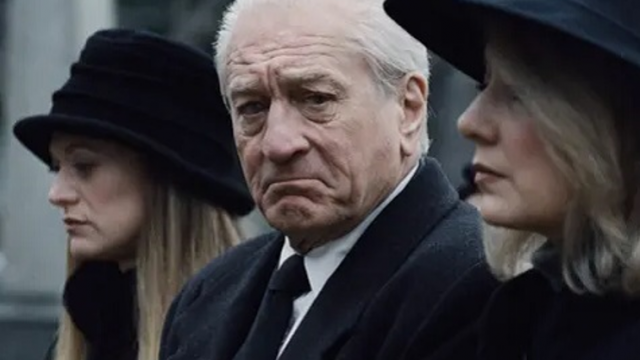
The law has determined that a corporation is a person, albeit one that is not beholden to the degradations of the flesh. Maybe the people running corporations see that as a path to immortality – the company can’t decay and as long as they keep the money coming in, they’ll survive. And the best way to keep the money coming in is to take it from others without spending your own on anything but a sure return. To keep the mill grinding and not think too hard about what’s coming out. Frank Sheeran, company man, certainly believes that. And this is different than Howard’s blithe dismissal of consequence, or even the Peloton Wife’s belief that she can pedal her way to a longer life.
They’re trying to game the system that Frank embraces and if they’re going to lose, well, so is he, whether he keeps his door open or not. And so are the bosses and CEOs and powerful shitheads who make the lack of risk, a kind of living death, the only thing on the market. We can’t escape the end, but while we’re here we can look for art that isn’t beholden to indifference or market calculation – a large-scale production of despair, a small film of abrasion, a pervy détournement of a stupid ad – art that takes risks. Because risk is how we feel alive, and we won’t be alive for long.

